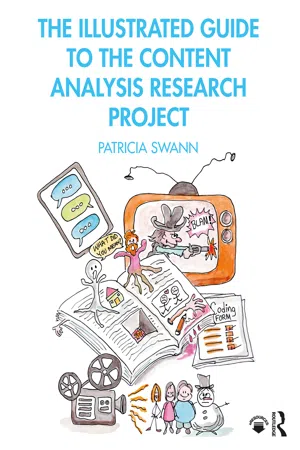
- 140 pages
- English
- ePUB (mobile friendly)
- Available on iOS & Android
The Illustrated Guide to the Content Analysis Research Project
About this book
The Illustrated Guide to the Content Analysis Research Project makes mass media research more accessible through an informal and humorous student-centered approach.
Author Patricia Swann provides a colorful, step-by-step guide to developing a typical mass media research project using the content analysis method. The fundamental elements of this research method are presented in plainspoken language perfect for undergraduates and new researchers, complete with engaging illustrations and an informal narrative that tackle students' most common sticking-points when learning and applying research methods.
Supplemented by online worksheets for further reflection, this book is an excellent companion to research-centered courses in mass media, communication studies, marketing, and public relations at the introductory level.
Frequently asked questions
- Essential is ideal for learners and professionals who enjoy exploring a wide range of subjects. Access the Essential Library with 800,000+ trusted titles and best-sellers across business, personal growth, and the humanities. Includes unlimited reading time and Standard Read Aloud voice.
- Complete: Perfect for advanced learners and researchers needing full, unrestricted access. Unlock 1.4M+ books across hundreds of subjects, including academic and specialized titles. The Complete Plan also includes advanced features like Premium Read Aloud and Research Assistant.
Please note we cannot support devices running on iOS 13 and Android 7 or earlier. Learn more about using the app.
Information
1
Getting Started
The Benefits
- Résumé Builder—Your research paper should be on your résumé along with other academic accomplishments. A research project tells a potential employer that you’re capable of a high level of critical thinking and that your decision making is data driven.
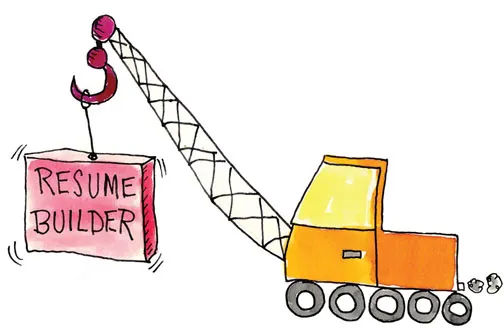 Research experience is a résumé builder.
Research experience is a résumé builder. - Résumé Skills—Your résumé should list all the research methods skills you have used in class assignments and your research project.
- Student Research Jobs—At every level of higher education, student jobs are available in research. There are research lab assistant positions, graduate assistant positions, and even research jobs in your college’s research office.
- Job Search Leverage—If allowed, select a research topic that relates to your career interests. You can use what you learn from your project in a job interview to show your level of interest and expertise in the field.
- Research Career—Some students find they have a knack for research once they try it. Many careers in industry and academia require research skills.
- Master’s Degree—If you are thinking about a master’s degree program, research experience will prepare you for the program’s research expectations.
- Ph.D. Degree—A Ph.D. dissertation is an in-depth research project and follows the steps outlined in this guide.
- Conference Presentations—Once you have completed a research project, you can present your research at academic or professional research conferences. Most conferences offer presentation space to students. If your college does not offer a student research conference, check with other nearby colleges and ask if they would allow you to present your research. These presentations are résumé worthy.
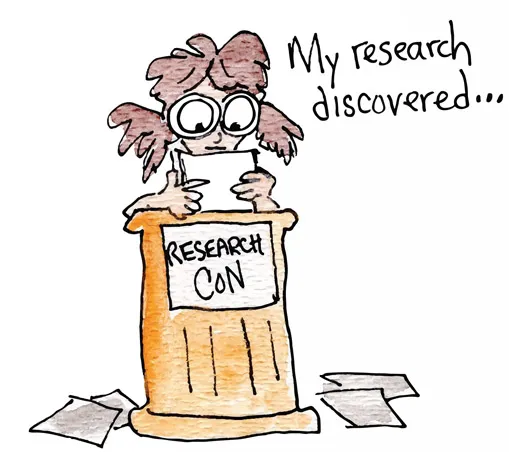 Yes! You could be behind that podium as a conference presenter.
Yes! You could be behind that podium as a conference presenter. - Publication Opportunities—Academic journals and professional publications may accept student research projects, especially those supervised by a faculty member. Websites, blogs, and some media outlets publish student research. Your research paper may need to be reformatted and revised to meet their readers’ needs.
- Consumer Understanding—Whether or not you do anything else with academic research after this project is completed, you’ll find research is everywhere. For example, research often forms the basis for news media reports on health and other subjects, so understanding how research is conducted can help you judge and understand the findings.
Developing a Research Mindset
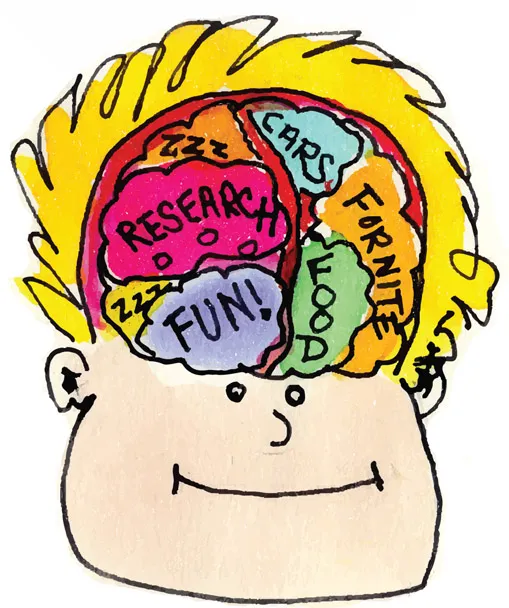
- The New York Times
- The Wall Street Journal
- The Guardian
- National Public Radio—www.npr.org/sections/research-news/
- National Geographic—www.nationalgeographic.com/science/
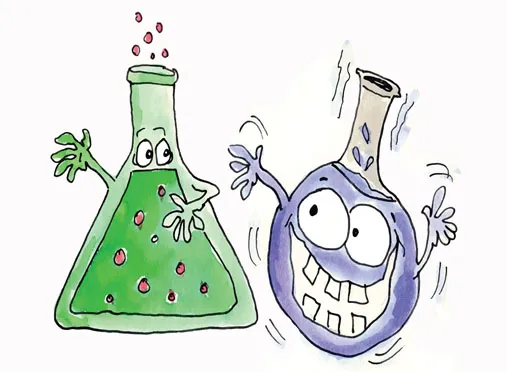
- Science Daily—www.ScienceDaily.com
- Futurity—www.futurity.org/
- The Conversation—https://TheConversation.com
- Science X—https://sciencex.com
- Live Science—www.livescience.com
- Nature—www.nature.com/
- PNAS (Proceedings from the National Academy of Sciences)—www.pnas.org
- Scientific American—www.scientificamerican.com/
- Wired—www.wired.com/category/science/
- Talk Nerdy—www.carasantamaria.com
- The Guardian Science Weekly—www.theguardian.com/science/series/science
- The Skeptics’ Guide to the Universe—www.theskepticsguide.org/podcasts
- Nature Podcast—www.nature.com/nature/articles?type=nature-podcast
- The Naked Scientists—www.thenakedscientists.com/podcasts/naked-scientists-podcast
- Science VS—https://gimletmedia.com/shows/science-vs
- Hidden Brain—www.npr.org/series/423302056/hidden-brain
- Scientific American, 60-Second Science—www.scientificamerican.com/podcasts/
- Radiolab—www.wnycstudios.org/podcasts/radiolab
- Science Friday—www.sciencefriday.com/
- Everyday Research Methods Blog—www.everydayresearchmethods.com/
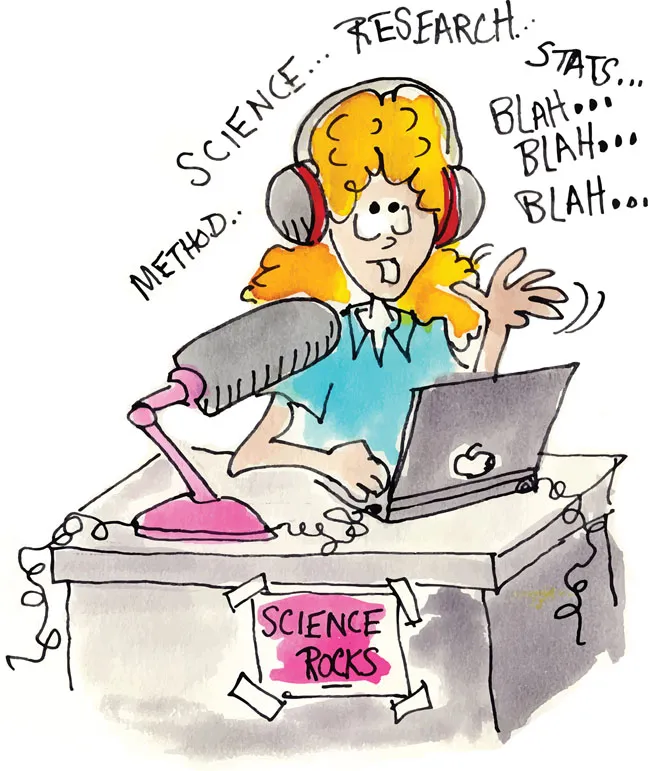 Science podcasts, websites, blogs, and other news about research abound.
Science podcasts, websites, blogs, and other news about research abound. - The Guardian—www.theguardian.com/science/series/science-blog-network
- Scientific American—https://blogs.scientificamerican.com/
Science YouTube Videos
- Scientific American—www.youtube.com/user/SciAmerican/videos
- Kurzgesagt—In a Nutshell—www.youtube.com/user/Kurzgesagt/videos
- BBC Earth Lab—www.youtube.com/channel/UCdsOTr6SmDrxuWE7sJFrkhQ
- Physics Girl—www.youtube.com/user/physicswoman
- AsapSCIENCE—www.youtube.com/user/AsapSCIENCE
- Nerdologia (with English subtitles)—www.youtube.com/user/nerdologia/videos
- SmarterEveryDay—www.youtube.com/user/destinws2
- Veritasium—www.youtube.com/user/1veritasium/videos
- TheBrainScoop—www.youtube.com/user/thebrainscoop/videos
- Vsauce—www.youtube.com/user/Vsauce/videos
- Brain Craft—www.youtube.com/user/braincraftvideo/videos
- Two Minute Papers—www.youtube.com/user/keeroyz/videos
- Gross Science—www.youtube.com/user/grossscienceshow/featured
- A Capella Science—www.youtube.co...
Table of contents
- Cover
- Half Title
- Title Page
- Copyright Page
- Dedication Page
- TABLE OF CONTENTS
- Introduction: What This Guide Offers
- CHAPTER ONE Getting Started
- CHAPTER TWO Understanding the Scientific Method
- CHAPTER THREE Finding Your Research Approach
- CHAPTER FOUR Ethical Considerations
- CHAPTER FIVE Picking Your Research Topic
- CHAPTER SIX Writing the Literature Review Section
- CHAPTER SEVEN Writing the Hypothesis and Research Question
- CHAPTER EIGHT Writing the Method Section
- CHAPTER NINE Writing the Results Section
- CHAPTER TEN Writing the Discussion and Conclusion Sections
- CHAPTER ELEVEN Writing the Abstract
- CHAPTER TWELVE Formatting, References, and Appendices
- CHAPTER THIRTEEN Sharing Your Research
- Appendix: Content Analysis Studies
- Index